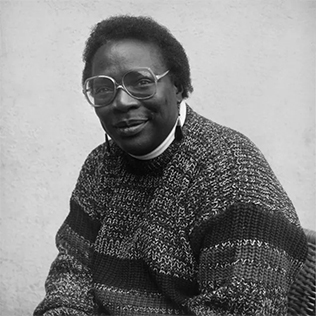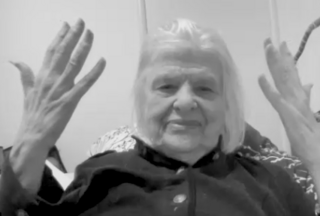Related Research Articles

Sonia Ann Johnson, is an American feminist activist and writer. She was an outspoken supporter of the Equal Rights Amendment (ERA) and in the late 1970s was publicly critical of the position of the Church of Jesus Christ of Latter-day Saints, of which she was a member, against the proposed amendment. She was eventually excommunicated from the church for her activities. She went on to publish several radical feminist books, ran for president in 1984, and become a popular feminist speaker.
Susan Griffin is a radical feminist philosopher, essayist and playwright particularly known for her innovative, hybrid-form ecofeminist works.
Sexual violence is any sexual act or attempt to obtain a sexual act by violence or coercion, act to traffic a person, regardless of the relationship to the victim. It occurs in times of peace and armed conflict situations, is widespread, and is considered to be one of the most traumatic, pervasive, and most common human rights violations.

Ms. is an American feminist magazine co-founded in 1971 by journalist and social/political activist Gloria Steinem. It was the first national American feminist magazine. The original editors were Letty Cottin Pogrebin, Mary Thom, Patricia Carbine, Joanne Edgar, Nina Finkelstein, Mary Peacock, Margaret Sloan-Hunter, and Gloria Steinem. Beginning as a one-off insert in New York magazine in 1971, the first stand-alone issue of Ms. appeared in January 1972, with funding from New York editor Clay Felker. It was intended to appeal to a wide audience and featured articles about a variety of issues related to women and feminism. From July 1972 until 1987, it was published on a monthly basis. It now publishes quarterly.
Susan Brownmiller is an American journalist, author and feminist activist best known for her 1975 book Against Our Will: Men, Women, and Rape, which was selected by The New York Public Library as one of 100 most important books of the 20th century.

The Violence Against Women Act of 1994 (VAWA) is a United States federal law signed by President Bill Clinton on September 13, 1994. The Act provided $1.6 billion toward investigation and prosecution of violent crimes against women, imposed automatic and mandatory restitution on those convicted, and allowed civil redress when prosecutors chose to not prosecute cases. The Act also established the Office on Violence Against Women within the U.S. Department of Justice.

Violence against women (VAW), also known as gender-based violence and sexual and gender-based violence (SGBV), are violent acts primarily or exclusively committed by men or boys against women or girls. Such violence is often considered a form of hate crime, committed against women or girls specifically because they are female, and can take many forms.
Dorchen A. Leidholdt is an activist and leader in the feminist movement against violence against women. Since the mid-1970s, she has counseled and advocated for rape victims, organized against "the media's promotion of violence against women", served on the legal team for the plaintiff in a precedent-setting sexual harassment case, founded an international non-governmental organization fighting prostitution and trafficking in women and children, directed the nation's largest legal services program for victims of domestic violence, advocated for the enactment and implementation of laws that further the rights of abused women, and represented hundreds of women victimized by intimate partner violence, human trafficking, sexual assault, the threat of honor killing, female genital mutilation, forced and child marriage, and the internet bride trade.

Anne Pride was a National Organization for Women (NOW) activist and publisher. Pride, an activist against rape, began using the term "Take Back the Night" in 1977. Pride helped found one of the first rape crisis centers and was involved in protecting the privacy of her clients.

Pat Parker was an American poet and activist. Both her poetry and her activism drew from her experiences as an African-American lesbian feminist. Her poetry spoke about her tough childhood growing up in poverty, dealing with sexual assault, and the murder of a sister. At eighteen, Parker was in an abusive relationship and had a miscarriage after being pushed down a flight of stairs. After two divorces she came out as lesbian "embracing her sexuality" and said she was liberated and "knew no limits when it came to expressing the innermost parts of herself".

Domestic violence is violence or other abuse that occurs in a domestic setting, such as in a marriage or cohabitation. Domestic violence is often used as a synonym for intimate partner violence, which is committed by one of the people in an intimate relationship against the other person, and can take place in relationships or between former spouses or partners. In its broadest sense, domestic violence also involves violence against children, parents, or the elderly. It can assume multiple forms, including physical, verbal, emotional, economic, religious, reproductive, or sexual abuse. It can range from subtle, coercive forms to marital rape and other violent physical abuse, such as choking, beating, female genital mutilation, and acid throwing that may result in disfigurement or death, and includes the use of technology to harass, control, monitor, stalk or hack. Domestic murder includes stoning, bride burning, honor killing, and dowry death, which sometimes involves non-cohabitating family members. In 2015, the United Kingdom's Home Office widened the definition of domestic violence to include coercive control.
Florence Rush was an American certified social worker, feminist theorist and organizer best known for introducing The Freudian Coverup in her presentation "The Sexual Abuse of Children: A Feminist Point of View", about childhood sexual abuse and incest, at the April 1971 New York Radical Feminists (NYRF) Rape Conference. Rush's paper at the time was the first challenge to Freudian theories of children as the seducers of adults rather than the victims of adults' sexual/power exploitation.

Andrea Rita Dworkin was an American radical feminist writer and activist best known for her analysis of pornography. Her feminist writings, beginning in 1974, span 30 years. They are found in a dozen solo works: nine books of non-fiction, two novels, and a collection of short stories. Another three volumes were co-written or co-edited with US Constitutional law professor and feminist activist, Catharine A. MacKinnon.

Laura X, is a women's rights advocate. Laura X changed her name in 1962 to Laura Shaw Murra, which remains her legal name. She took the name Laura X, on September 17, 1969, to symbolize her rejection of men's legal ownership of women and the anonymity of women's history, which she said was stolen from women and girls. She declared that, like Malcolm X, "I don't want to have my owner's name, either."

Rape Culture is a 1975 film by Cambridge Documentary Films, produced by Margaret Lazarus and Renner Wunderlich. It was updated in 1983.
Susan Ware is an American independent scholar, writer and editor who lives in Cambridge, Massachusetts, and Hopkinton, New Hampshire. The author of eight biographies, two edited collections, and co-editor of a textbook, Ware is a specialist on 20th-century women's political and cultural history, and the history of popular feminism.

Lois Galgay Reckitt is an American feminist, human rights activist, LGBT rights activist, and domestic violence advocate. Called "one of the most prominent advocates in Maine for abused women", she served as executive director of Family Crisis Services in Portland, Maine for more than three decades. From 1984 to 1987 she served as executive vice president of the National Organization for Women in Washington, D.C. She is a co-founder of the Human Rights Campaign Fund, the Maine Coalition for Human Rights, the Maine Women's Lobby, and the first Maine chapter of the National Organization for Women. She was inducted into the Maine Women's Hall of Fame in 1998.

Carceral feminism is a critical term for types of feminism that advocate for enhancing and increasing prison sentences that deal with feminist and gender issues. It is the belief that harsher and longer prison sentences will help work towards solving these issues. The phrase "carceral feminism" was coined by Elizabeth Bernstein, a feminist sociologist, in her 2007 article, "The Sexual Politics of the 'New Abolitionism'". Examining the contemporary anti-trafficking movement in the United States, Bernstein introduced the term to describe a type of feminist activism which casts all forms of sexual labor as sex trafficking. She sees this as a retrograde step, suggesting it erodes the rights of women in the sex industry, and takes the focus off other important feminist issues, and expands the neoliberal agenda.
Susan Schechter was an American feminist and activist against domestic violence. She wrote three books on the subject and helped found one of the first women's shelters.
Pauline Bernice Bart was an American sociologist who studied gender inequality, violence against women, and women's development.
References
- 1 2 Brownmiller, Susan (2000). In Our Time: Memoir of a Revolution. Dial Press. pp. 272–273. ISBN 978-0-385-31831-0.
- ↑ "Battered Women Gain Floor As Washington Gathers Data". Hartford Courant. 1977-07-27. p. 13. Retrieved 2019-12-22– via Newspapers.com.
- 1 2 Wood, Ann (1978-02-25). "A Leader in the Fight for Battered Women". Daily News. p. 10. Retrieved 2019-12-22– via Newspapers.com.
- ↑ "4. Peggy Guggenheim Collection". Guggenheim. 2019-04-19. Retrieved 2019-12-22.
- ↑ Solomon R. Guggenheim Museum; Theodoron (Foundation) . (1971). Ten young artists : Theodoron awards : [exhibition, Sept. 24-Nov. 7, 1971] the Solomon R. Guggenheim Museum, New York. Solomon R. Guggenheim Museum. New York : Solomon R. Guggenheim Foundation. p. 26 – via Internet Archive.
- ↑ United States Commission on Civil Rights (1983). Battered Women: Issues of Public Policy : a Consultation Sponsored by the United States Commission on Civil Rights, Washington, D.C., January 30-31, 1978. The Commission. pp. 357–363.
- ↑ Shepard, Jan (1977-12-11). "Beaten Wives Find a Secret Shelter". Daily News. p. 219. Retrieved 2019-12-22– via Newspapers.com.
- ↑ Klemesrud, Judy (April 30, 1977). "Wives Recite Litany of Abuse by Their Husbands". p. 39 – via ProQuest.
- ↑ Pawlyna, Andrea (1975-11-15). "Conference Held to Launch Rape Crisis Center". Poughkeepsie Journal. p. 3. Retrieved 2019-12-22– via Newspapers.com.
- ↑ "Guide to the National Organization for Women, New York City Chapter (NOW-NYC) Records TAM.106". Tamiment Library and Robert F. Wagner Labor Archive, Elmer Holmes Bobst Library, New York University. Retrieved 2019-12-22.
- ↑ Ellison, Alice A. (1980-01-24). "Meeting to Focus on Domestic Violence". The Evening Sun. p. 22. Retrieved 2019-12-22– via Newspapers.com.
- ↑ "Central Park Night Walk Protests Rapes". The New York Times. 1976-08-05. ISSN 0362-4331 . Retrieved 2019-12-22.
- ↑ United States. Congress. House. Committee on Science and Technology. Subcommittee on Domestic and International Scientific Planning, Analysis, and Cooperation, Research Into Violent Behavior: Overview and Sexual Assaults (U.S. Government Printing Office, 1978).
- 1 2 Education, United States Congress House Committee on Education and Labor Subcommittee on Select (1978). Domestic Violence: Hearings Before the Subcommittee on Select Education of the Committee on Education and Labor, House of Representatives, Ninety-fifth Congress, Second Session, on H.R. 7927 and H.R. 8948 ... March 16 and 17, 1978. U.S. Government Printing Office. pp. 403–410.
- ↑ Bako, Yolanda. How to start a county-wide task force on family violence (American Friends Service Committee 1980).
- 1 2 "Report on the Feminist Reunion, June 10, 2017" Veteran Feminists of America.
- ↑ Reinholz, Mary. "Veteran feminists show they’re young at heart at reunion" The Villager (June 15, 2017).
- ↑ Papers of Yolanda Bako, 1970-1995, Schlesinger Library, Radcliffe Institute, Harvard University.